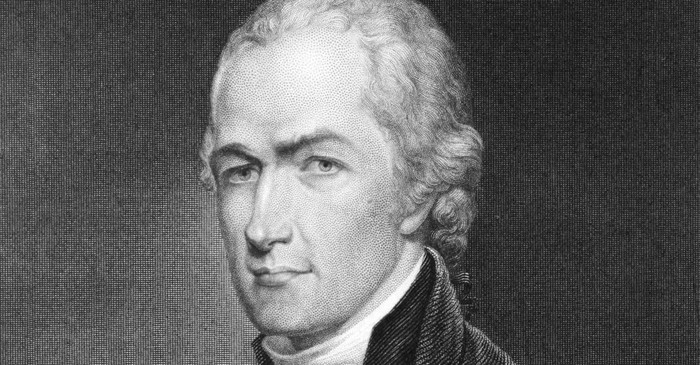What Alexander Hamilton Can Teach Christians about Living in Faith
- Whitney Hopler Crosswalk.com Contributing Writer
- Updated Jul 03, 2023

Standing in front of Redoubt 10 at Yorktown Battlefield in Virginia, I imagined how much courage it must have taken Alexander Hamilton to lead a battalion of soldiers in a charge there during the American Revolutionary War. They took British soldiers inside the fort by surprise in the middle of the night on October 14, 1781, charging forward with no ammunition (only bayonets to stay quiet), then rushing over logs with treacherous spikes to enter the fort and jump on the well-armed British. Hamilton, whose brave work as an American founding father is now celebrated in the hit Broadway show and soundtrack Hamilton, led his men to capture the fort for George Washington’s Continental Army.
In a matter of minutes, Hamilton’s soldiers overpowered the British, who were caught sleeping and unprepared – despite their ammunitions advantage. That critical achievement led to victory at Yorktown, which became the last major battle of the war to win American independence from Britain and create the USA.
But Hamilton could have chosen not to fight at Yorktown. His wife Eliza was expecting their first child soon. Instead of staying at home in New York, he asked Washington to appoint him to lead the dangerous charge at Yorktown. He wrote to Eliza about his decision shortly before the battle: “I am going to do my duty. Our operations will be so conducted, as to economize the lives of men. Exert your fortitude and rely upon heaven.” Hamilton was confident that he could take on the challenge well, because of his faith in God’s help.
Hamilton became known for taking all sorts of major risks to invest in our nation’s future. He created our nation’s first bank and formed much of its commercial laws – working diligently despite criticism from those who were suspicious of his new ideas. He wrote the majority of essays in The Federalist Papers to inspire divided Americans to unite behind the new US Constitution and learn how to work together to build our new country.
Today, we celebrate Hamilton for his remarkable, and even audacious, courage. He did what many others were afraid to do – and he did so without knowing how it would all turn out. Why? Hamilton made a lifelong habit of asking God one key question: “How can I be bolder?”
Here’s how asking God that same question yourself can lead you to make your own great contributions to God’s work in America:
Remember who you’re asking for courage.
God is all-powerful, and he wants the best for you. So you can be confident in trusting God when you take the risks he calls you to take. Like everyone else, you will encounter doubt in your life. But if you respond to your doubts by searching for a deeper faith, as Hamilton did, God will meet you where you are and help you grow. Hamilton, who was a lawyer as well as a military officer, looked for – and found – evidence that he could trust God. As he once wrote, “I have examined carefully the evidence of the Christian religion, and if I was sitting as a juror upon its authenticity, I should rather abruptly give my verdict in its favor.” When you ask for greater boldness, you’re asking your trustworthy Creator, who can reliably give you courage in any situation.
Take a stand for what you believe in by taking action.
Hamilton was a man of action. He didn’t hesitate to work hard on causes that he believed God led him to pursue. Sometimes, Hamilton’s projects were controversial. He upset some people by acting on his beliefs – including political rivals Thomas Jefferson (who argued with Hamilton about federal versus states’ rights when they served in Washington’s administration together) and Aaron Burr (who ended up killing Hamilton in a duel). While God doesn’t want you to make enemies as Hamilton sometimes did, he does want you stand up for your convictions. The Bible story of three faithful young men (Shadrach, Meshach, and Abednego) who faced a fiery furnace rather than back down from their convictions (Daniel, chapter 3) shows that God honors those who act on their beliefs. “Those who stand for nothing will fall for everything,” Hamilton once wrote. What convictions is God calling you to act on? How is he leading you to do so? Don’t be afraid to move forward.
Be prepared to make sacrifices for a cause.
Too many great ideas die because people don’t invest time, money, and energy into following through on them. When God calls you to support a cause, he will provide what you need to do it – but not necessarily all that you want. Hamilton’s Yorktown experience exemplifies that. He and others in the Continental Army had to march hundreds of miles south from New York City to Yorktown, carrying heavy loads of supplies and equipment with them. Once they encamped at Yorktown, they sacrificed their comfort in order to fight for freedom. Hamilton and his colleagues endured separation from loved ones, hunger, exhaustion, and constant life-threatening danger. Some men were killed in combat; more (including Washington’s adopted son) died from camp diseases like typhus, typhoid fever, and malaria. In Luke chapter 14, Jesus advises counting the cost of the work you undertake for his kingdom, saying in verse 27: “… whoever does not carry their cross and follow me cannot be my disciple.”
Trust God to do what you can’t.
Simply do your best, day by day, with the work God leads you to do. When you do your part faithfully, God will faithfully do his part.
God created you – just as he did Hamilton – with a unique purpose to fulfill in our nation and the whole world. Let’s Hamilton’s life inspire you to boldly discover and fulfill that God-given purpose. The last song on the Hamilton soundtrack asks “Who lives, who dies, who tells your story?” You can be confident that your legacy will be great if you ask God how you can be bolder each day, and rely on the Holy Spirit to empower you!
Whitney Hopler works as Communications Coordinator at George Mason University’s Center for the Advancement of Well-Beingand has written for Crosswalk.com since 2001. She also writes for Thrive Global and blogs. Learn more on Twitter, Facebook, and Google Plus.
Photo credit: ©Thinkstock/GeorgiosArt

.jpg)
















